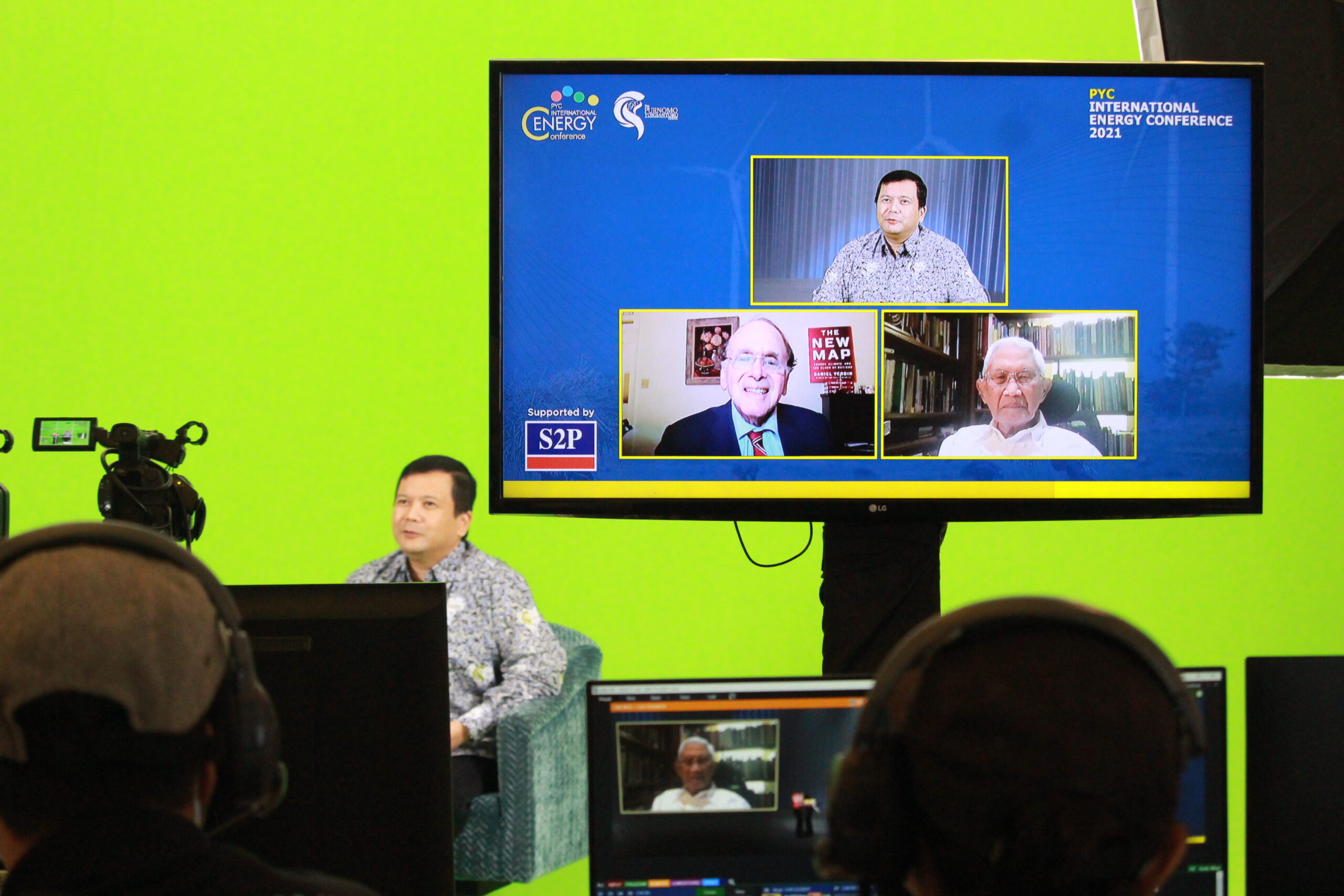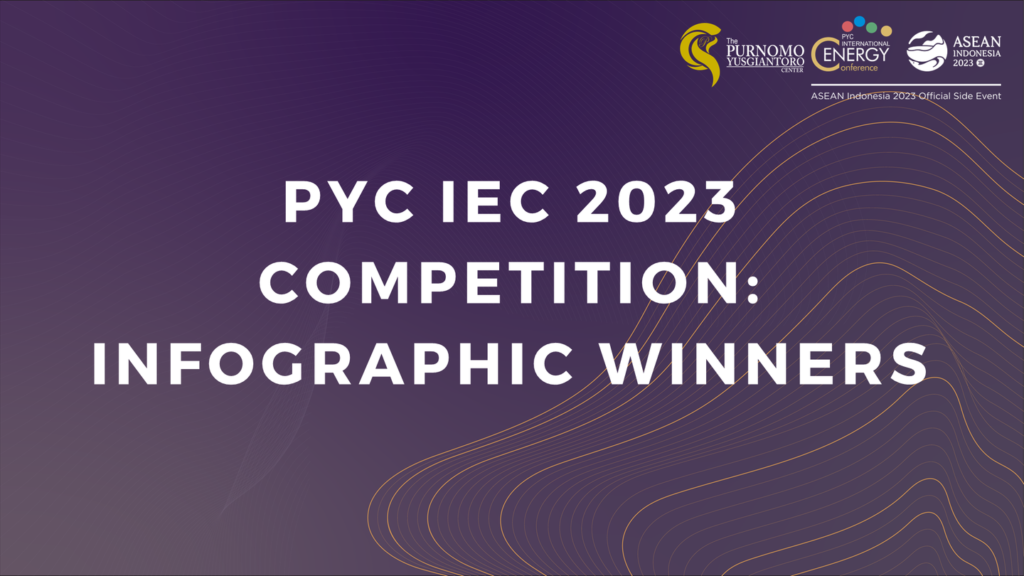PURNOMO YUSGIANTORO CENTER
INTERNATIONAL ENERGY CONFERENCE 2023
“Collaboration in Action for Inclusive Energy Roadmap”
2 Days, 2 Sessions, 4 Competitions
PYC INTERNATIONAL ENERGY CONFERENCE
PYC will hold its biennial flagship program, PYC International Energy Conference (PYC IEC) 2023, aiming to bring local and global stakeholders, including but not limited to students, researchers, experts, governments, and private sectors, to discuss global energy issues, in the world and Indonesia in particular. In this fourth installment, PYC chooses the theme “Collaboration in Action for Inclusive Energy Roadmap”, highlighting the importance of the demand-side end-use energy sector in accelerating the energy transition.

Do not wait until the last minute
THE CONFERENCE STARTS IN > >> >>>
Upcoming Events > >> >>>
PLENARY SESSION
The plenary session aims to provide insights and the latest findings into the strategies of renowned experts from various perspectives. The session also aims to educate participants on the importance of supply-side and demand-side collaboration to create an inclusive energy transition roadmap, especially in ASEAN and Indonesia in particular. The plenary session will deliver these goals from (5) five perspectives.
- Human capital perspective will discuss the government’s plan for preparing Indonesia’s human capital to support net zero emissions, including the energy transition program. Additionally, this session will explore the potential collaborations between ministries and ASEAN member states that are necessary to support and enhance this plan and how these collaborative efforts can contribute to boosting the energy transition not only within Indonesia but also across the ASEAN region.
- The government perspective will discuss an overview of the current national energy transition status and strategic plan for supply and demand side management, as well as the contribution from Indonesia in enhancing the energy transition in ASEAN. The discussion will also emphasize the major obstacles in providing clean energy for the end-use energy sector from the government’s perspective.
- The education perspective will discuss the transformation of ASEAN education system towards a just transition. Education for the just transition must affirm the importance of teachers and students as agents of transformation and promote critical educational practices and approaches which support the transition to a low-carbon economy and which value the characteristics of justice, that include equity, equality, fairness, and inclusiveness to build a curriculum that advocates sustainable growth.
Hence, ASEAN member states can draw on these lessons to develop comprehensive approaches integrating education, research, vocational training, industry collaboration, and lifelong learning for a successful energy transition. - Industry perspective will discuss how Vietnam successfully aligns its renewable energy plan with the development of its manufacturing sector. By exploring this integration, we can uncover valuable lessons that can benefit not only Vietnam but also other ASEAN countries. Sharing best practices and insights will foster regional collaboration and help accelerate the adoption of sustainable energy practices across the ASEAN region, contributing to a greener and more resilient future for all.
- Transportation sector will explore how Thailand has successfully integrated its renewable energy plan with its transportation plan, creating a harmonious synergy between sustainable energy sources and transportation infrastructure. The valuable lessons learned from Thailand’s experience have the potential to greatly benefit other ASEAN countries, facilitating knowledge exchange and collaborative efforts towards developing environmentally conscious transportation systems throughout the region.
OPENING REMARKS
H.E. Joko Widodo*
WELCOMING REMARKS
Filda C. Yusgiantoro
KEYNOTE SPEECH
Francesco La Camera*
PANELISTS
H.E. Arifin Tasrif*
H.E. Nadiem Makarim*
H.E. Chan Chun Sing*
H.E. Nguyen Hong Dien*
H.E. Saksayam Chidchob*
CHAIR
Jisman P. Hutajulu*
OPENING CEREMONY
OPENING REMARKS
H.E. President
Joko Widodo*
KEYNOTE SPEECH
John Thwaites
HOST REMARKS
Filda C. Yusgiantoro
WELCOMING SPEECH
H.E. Arifin Tasrif
PLENARY SESSION
The plenary session aims to provide insights and the latest findings into the strategies of renowned experts from various perspectives. The session also aims to educate participants on the importance of supply-side and demand-side collaboration to create an inclusive energy transition roadmap, especially in ASEAN and Indonesia in particular. The plenary session will deliver these goals from (5) five perspectives.
- Human capital perspective will discuss the government’s plan for preparing Indonesia’s human capital to support net zero emissions, including the energy transition program. Additionally, this session will explore the potential collaborations between ministries and ASEAN member states that are necessary to support and enhance this plan and how these collaborative efforts can contribute to boosting the energy transition not only within Indonesia but also across the ASEAN region.
- The energy perspective will discuss an overview of the current national energy transition status and strategic plan for supply and demand side management, as well as the contribution from Indonesia in enhancing the energy transition in ASEAN. The discussion will also emphasize the major obstacles in providing clean energy for the end-use energy sector from the government’s perspective.
- The education perspective will discuss the transformation of ASEAN education system towards a just transition. Education for the just transition must affirm the importance of teachers and students as agents of transformation and promote critical educational practices and approaches which support the transition to a low-carbon economy and which value the characteristics of justice, that include equity, equality, fairness, and inclusiveness to build a curriculum that advocates sustainable growth.
Hence, ASEAN member states can draw on these lessons to develop comprehensive approaches integrating education, research, vocational training, industry collaboration, and lifelong learning for a successful energy transition. - Industry perspective will discuss how Vietnam successfully aligns its renewable energy plan with the development of its manufacturing sector. By exploring this integration, we can uncover valuable lessons that can benefit not only Vietnam but also other ASEAN countries. Sharing best practices and insights will foster regional collaboration and help accelerate the adoption of sustainable energy practices across the ASEAN region, contributing to a greener and more resilient future for all.
- Transportation sector will explore how Thailand has successfully integrated its renewable energy plan with its transportation plan, creating a harmonious synergy between sustainable energy sources and transportation infrastructure. The valuable lessons learned from Thailand’s experience have the potential to greatly benefit other ASEAN countries, facilitating knowledge exchange and collaborative efforts towards developing environmentally conscious transportation systems throughout the region.
PANELISTS
Energy Perspective
H.E. Arifin Tasrif
Human Capital Perspective
H.E. Nadiem Makarim
Education Perspective
H.E. Chan Chun Sing
Industry Perspective
Taufiek Bawazier
ASEAN Perspective
H.E. Kao Kim Hourn*
Nuki Agya Utama*
Transportation Perspective
H.E. Dato' Syed Md Hasrin Tengku Hussin
Plenary Session Chair
Bambang Brodjonegoro
PARALLEL SESSION
The parallel sessions aim to dig deeper into the strategy and efforts in strengthening collaboration in action for an inclusive energy roadmap viewed from (3) three different perspectives that penetrate the energy transition; policy, human capital, and financing. There will be (4) four expert speakers invited to share their perspectives on each specific topic.
POLICY SESSION
"Accelerating The Demand-side Energy Transition Policy"
Panelists
Yudo Dwinanda Priaadi
Bobby Gafur Umar
Sue Armstrong-Brown
JOHN BLACK
MODERATOR
Alexander E. Wibowo
HUMAN CAPITAL SESSION
"Preparing Human Capital for Energy Transition "
PANELISTS
Eric Roeder
Anindito Aditomo
Roberto Rossi
Djoko Santoso
Moderator
Filda C. Yusgiantoro
FINANCING SESSION
"Optimizing Multilateral Collaboration and Public Private Partnership (PPP) to Boost Energy Transition Financing"
PANELISTS
David Elzinga
Grant Hauber
Pradana Murti
Brahmantio Isdijoso
MODERATOR
Inka B. Yusgiantoro
PROJECT SHOWCASE
"Embracing Peer-to-Peer Electricity Trading using Distributed Ledger Technology in ASEAN"
PANELISTS
Alastair Marke
Michael Suryaprawira
Wanhar
Zainal Arifin
MODERATOR
Luky A. Yusgiantoro
* ) to be confirmed
Watch The Video
Last One Was Amazing
take a look
OFFICIAL SIDE EVENT OF ASEAN CHAIRMANSHIP


in collaboration with









